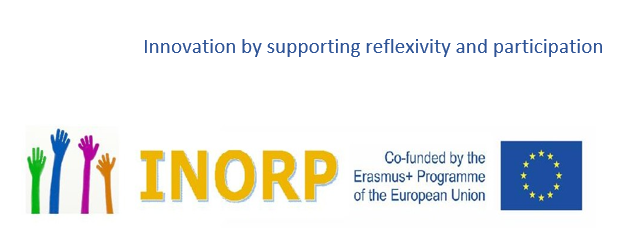Reflexivity and participation in communities

3. Level 1: Basic academic level (1st cycle) module
3.3. Lesson 3 (4 hours): Conceptual clarifications 1: Reflectivity
| Theme | Topic | Guiding questions |
| Psychological dimensions |
Reflecting - awareness - thinking Reflecting is an essential and very specifically human capacity. It is linked to the notion of awareness and indicates that human actions are distinguished by individual purpose-giving that is in turn embedded in social and cultural sets of meaning. Research on reflectivity demonstrates the neuro- scientific and psychological necessity of acknowledging the constant influence of pre- conscious conceptual social categories and structures which guide orientation but need to be subjected to processes of awareness in order to make interaction productive and creative. |
What circumstances stimulate my awareness? What is awareness then focused on? |
| Professional dimensions |
The ability to reflecting systematically legitimates professional autonomy AND accountability.
|
Think of any “social problem” you might have |
|
Political |
Reflection and democracy Voting rights in a democracy are granted on the basis that mature citizens can make “rational Citizenship presupposes, but also stimulates, reflective abilities in organising one’s relationship with others. Where these abilities are not (yet) fully developed, pedagogical assistance (not instruction!) is given, Proposal: “Democratic reflectivity” combines - with professional colleagues (in teams, or through professional supervision) |
What kind of considerations guide you on political voting occasions? How can you stimulate reflectivity in learning |
Resources:
*Adams, M. (2003). The reflexive self and culture: A critique. British Journal of Sociology, 54(2), 221– 238. https://doi.org/10.1080/0007131032000080212
*Archer, M. (2012). The Reflexive Imperative in Late Modernity. New York: Cambridge University Press.
D’Cruz, H., Gillingham, P. a Melendez, S. (2005). Reflexivity, its Meanings and Relevance for Social Work: A Critical Review of the Literature. British Journal of Social Work, 37(1), 73–90. https://doi.org/10.1093/bjsw/bcl001
Dzur, A. W. (2019). Democratic Professionals as Agents of Change. In A.W.Dzur, Democracy Inside: Participatory Innovation in Unlikely Places (pp. 1–24). Oxford: Oxford University Press. https://doi.org/10.1093/oso/9780190658663.003.0001
Ferguson, H. (2018). How social workers reflect in action and when and why they don’t: the possibilities and limits to reflective practice in social work. Social Work Education, 37(4), 415–427. https://doi.org/10.1080/02615479.2017.1413083
*Lieberman MD, Gaunt R, Gilbert DT a Trope Y. (2002). Reflection and reflexion: a social cognitive neuroscience approach to attributional inference. Advances in Experimental Social Psychology. 34:199– 249.
*Phillips, L. (2000). Risk, Reflexivity and Democracy. Nordicom Review, 21(2), 115–136. https://doi.org/10.1515/nor-2017-0389.
